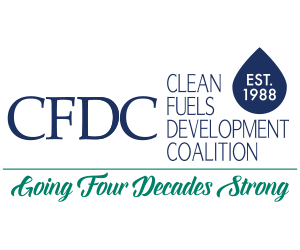CFDC News & Events
New Issue Brief on Next Generation Fuels Act
October 1, 2023: CFDC has produced an Issue Brief clearly explaining the provisions of the Next Gen legislation and makes a compelling case for its passage.
The new brief, the latest in CFDC’s highly successful Issue Brief and White Paper series, illustrates how this bill would open the market for higher ethanol blends that reduce carbon emissions, lower gasoline prices, reduce imports of foreign oil, and stimulate multiple sectors of the economy.
World Ethanol and Biofuels Conference
CFDC is once again a proud supporting organization for the World Ethanol and Biofuels Conference in Brussels, Belgium on November 6-9, 2023. CFDC Executive Doug Durante serves as one of the co-chairs of the conference and said “For 25 years this prestigious event brings together ethanol and biofuel stakeholders from more than 50 countries. We consider this conference to be the premier international event of its kind and have found it to be invaluable”.
New Issue Brief Challenges the EV Vision
Biofuels and a Technology Neutral Strategy the Better Approach
The widespread introduction of electric vehicles as a means of reducing carbon emissions presents a far greater challenge than the public is being led to believe, according to new research by the Clean Fuels Development Coalition (CFDC).
This conclusion is presented in Reality EV: No Silver Bullet, a new Issue Brief released here this week. Reality EV’s research explains the consumer/taxpayer, infrastructure, and environmental constraints single fuel source electric vehicles (EVs) must overcome to live up to their often-claimed perfect solution. In addition, it is estimated that a $2-3 trillion dollar government/taxpayer investment is needed for EVs to replace 50% of the consumer fleet.
CFDC Executive Director Doug Durante said this research is not intended to dismiss the potential contribution of EVs but rather to put them in perspective. “EVs will clearly be a key part of our transportation mix but the reality of cost, consumer choice, re-charging, and many other factors indicates we need to make sure biofuels remain part of the mix,” said Durante. “Increasing the octane of gasoline with clean burning ethanol allows for automakers to produce much more efficient vehicles that can provide health and climate benefits now, not decades from now.”
For the full press release and access to the Brief,
CFDC Comments on EPA Multipollutant Rule
An over reliance on electric vehicles, and failure to correct models and testing procedures plague the rule proposed by EPA that may fall well short of predicted benefits.
Ethanol’s Clean Octane Key to EPA Particulate Rule
Coalition Urges Administrator to Address Mobile Sources
September 6, 2022: In a detailed letter to the U.S. Environmental Protection Agency, the Clean Fuels Development Coalition (CFDC) called on the agency to use its existing authority to reduce toxic aromatics in gasoline as required by the Clean Air Act.
A pending rule to reduce fine particulate matter (pm) must include mobile source controls and address benzene and related toxics, according to CFDC. The letter notes that EPA in its report to Congress in 2011 acknowledged the serious health impacts of particulates and the relationship between aromatic compounds like benzene and fine pm emissions.
New White Paper Says The Real Cost of Gasoline …is to Our Health
May 15, 2022: A new White Paper from the Clean Fuels Development Coalition rings the alarm that EPA continues to miss opportunities to replace toxic aromatic compounds with clean burning ethanol and the agency could save thousands of lives through reduced particulate emissions in the air we breathe.
Fuel Economy Rule Needs High Octane
August 30, 2021: A wide range of stakeholders responded strongly to a proposed rule-making to tighten vehicle emissions by applauding the action but warning of near term health risks that must be addressed in the final rule.
Several organizations and individuals from the ethanol, auto, and climate sectors joined CFDC to tell the U.S. Environmental Protection Agency (EPA) that the failure to adopt a strategy and pathway to higher octane low carbon fuels will result in the 270 million cars on the road today continuing to emit not just greenhouse gases but also highly toxic particulates.
Click below for more information and links to comments.
CFDC Asks EPA–What Happened?
In testimony today to the U.S. Environmental Protection Agency on the new fuel economy rules, the Clean Fuels Development Coalition (CFDC) challenged the agency’s omission of any mention of clean octane even though they had previously acknowledged the relevance to fuel economy and reduced emissions.
“We think it’s a fair question for us to ask–what happened?” said CFDC Executive Director Doug Durante. Not only did EPA previously solicit comments on how high octane fuels could help meet the objectives of the fuel economy rule but they also were provided more updated data, particularly with respect to health impacts. Higher octane if instituted in concert with a control on toxic compounds currently used to increase octane would reduce a range of harmful emissions, which EPA had stated was a priority in the rule.
Agriculture and Ethanol Groups Echo Automakers Call for Higher-Octane Gasoline Standard in Fuel Economy Rule
CFDC joined with more than two dozen agriculture and ethanol groups urging President Biden to direct EPA to increase the minimum octane standard in gasoline. Raising octane with ethanol displaces toxic compounds refiners use and would allow automakers to increase mileage while reducing greenhouse gas emissions.
CFDC Calls ON EPA To Prioritize Octane in New Fuel Economy Rule
The Clean Fuels Development Coalition called the pending revision of the nation’s fuel economy rules one of the most immediate and tangible actions the Biden Administration can take to address a range of issues impacting climate, health, and economic challenges. In a letter congratulating incoming Environmental Protection Agency Administrator Michael Regan, CFDC called for the “Repeal & Replace” of the SAFE rule and cited an Amicus Brief supporting increased octane and toxic controls.

Durante and Governor Ben Nelson of Nebraska.
